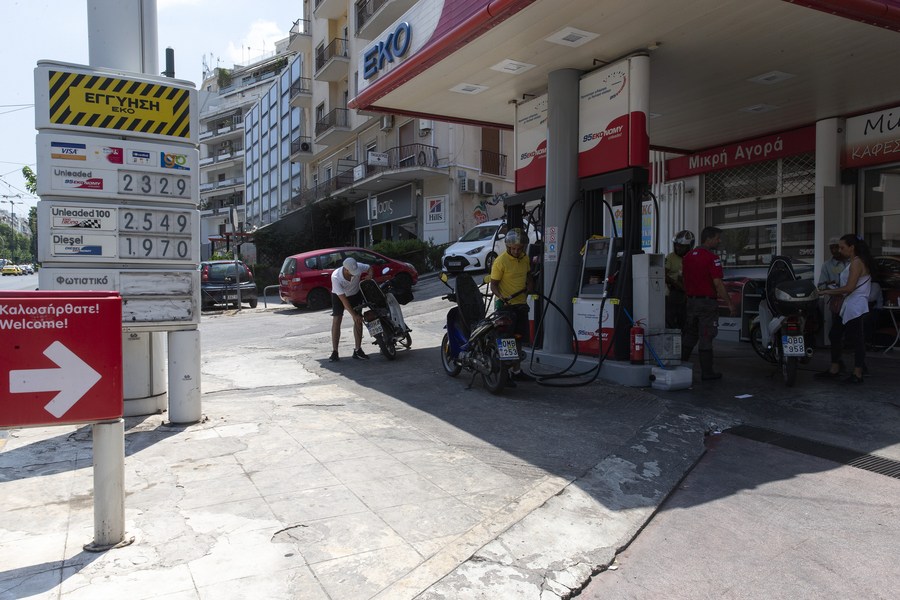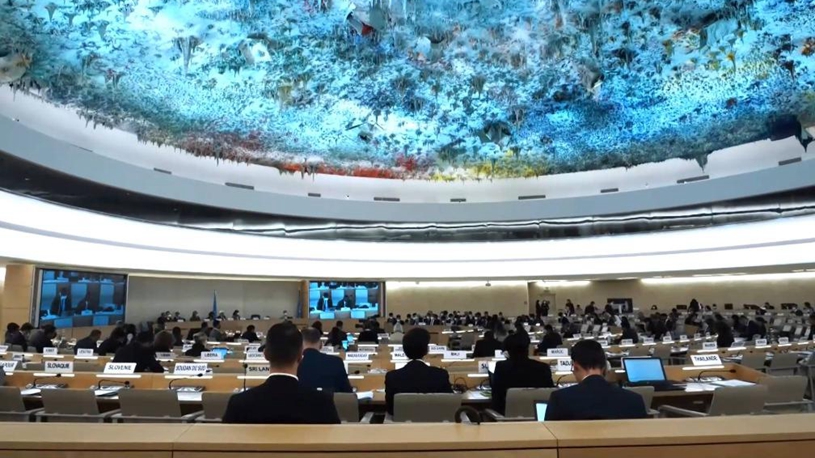
A staff member fuels a vehicle at a gas station in Athens, Greece, on June 21, 2022. (Xinhua/Marios Lolos)
Six out of ten Greeks are cutting back on their electricity consumption and eight in ten seek bargains and reduce or postpone unnecessary purchases, including food, in an effort to stay afloat amid soaring inflation, according to a recent survey.
ATHENS, Sept. 28 (Xinhua) -- Greeks are embracing energy efficiency in ever larger numbers these days as they feel the pinch of the energy crisis.
Households, municipalities and businesses alike have been increasingly conscious of their energy use, while the government is coming up with incentives and measures to support their efforts.
Andriana Kriemadi, a young hairdresser, is bracing for a heavy winter, but is still not sure how she will cope.
"Unfortunately, we cannot make savings on electricity, because it is necessary to blow the hair, perform treatments, do many things, technical work," she told Xinhua.
At home, she switches off the lights when she leaves a room and unplugs her television and computer when not in use. She is doing her best to lower her energy consumption and cost.
"This year does not compare to 2021. Bills, taxes, everything has gone up. Unfortunately, I don't know where this will end up," she said.
Six out of ten Greeks are cutting back on their electricity consumption and eight in ten seek bargains and reduce or postpone unnecessary purchases, including food, in an effort to stay afloat amid soaring inflation, according to a survey conducted between Aug.29 and Sept.2 by the Institute of Retail Consumer Goods (IELKA), a non-profit research organization.

A woman buys fruit and vegetables at a market in Athens, Greece, on July 8, 2022. (Xinhua/Marios Lolos)
In Greece, electricity consumption has been on the decline since this summer, the country's Independent Power Transmission Operator (IPTO or ADMIE in Greek) said earlier this week.
In August, energy consumption in households and industry decreased by 13.1 percent year-on-year. In July, the drop was 11.24 percent.
To address the crisis, the government has introduced penalties for public sector organizations and municipalities that will not meet the 10 percent energy efficiency target in the coming months compared to 2021.
Lights and other electrical devices in public buildings must now be switched off when not in use and heating and cooling systems must be properly maintained to ensure continued access to funding from the state budget.
Alimos, a suburb of Athens, is one of the municipalities that had taken steps to save electricity long before the crisis set in.
"First, we replaced (in 2019-2020) all the bulbs on city-owned street lights with energy-saving LED (light-emitting diode) lighting, so we're making a big saving there," the suburb's Mayor, Andreas Kondylis, told Xinhua.
The local government also installed more solar panels on the roofs of municipal buildings, schools, the town hall and services, and replaced natural gas burners with oil heaters in municipal institutions, such as in school swimming pools, Kondylis said.
Alimos has already met the 10 percent reduction target set by the central government and is moving further by introducing new measures, such as switching off street lighting, he explained.
Athens Mayor Kostas Bakoyannis has said that his city plans to replace 46,000 street lighting bulbs with LEDs in the coming months.
Two weeks ago, the country's Parliament decided to switch off all exterior lights on the building as part of the national effort to save energy.
To date, the Greek government has allocated 9.8 billion euros (9.44 billion U.S. dollars) to subsidize the electricity and natural gas bills of households and businesses, Finance Minister Christos Staikouras told Parliament last week.

A man fuels a motorcycle at a gas station in Athens, Greece, on July 8, 2022. (Xinhua/Marios Lolos)
However, the burden remains heavy for a society that emerged from a 10-year debt crisis only to face a pandemic and now an energy crisis, Kondylis said.
"People are extremely troubled, extremely anxious and under pressure financially by the high energy prices," he said, adding that "our society as a whole has been affected."
"I'm in fear because we hear a lot nowadays (about possible power cuts), but let's be optimistic and we'll make it," Kriemadi said. (1 euro= 0.96 U.S. dollar) ■












